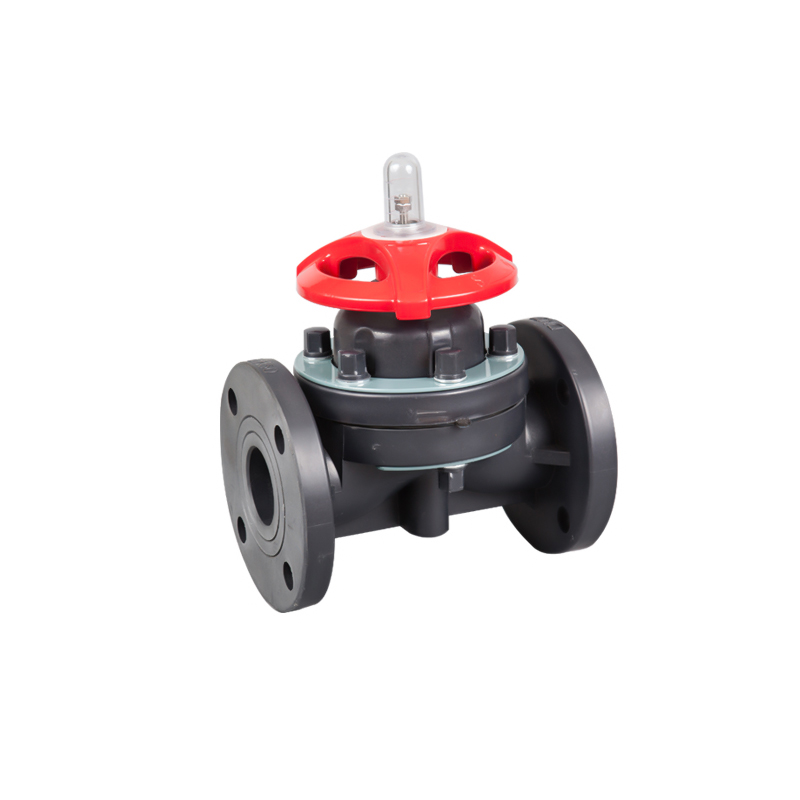Summary:PPH diaphragm valves are a specific type of valve widely used in industrial applications that involve the control or iso...
PPH diaphragm valves are a specific type of valve widely used in industrial applications that involve the control or isolation of aggressive or corrosive media. These valves feature a unique design with a flexible diaphragm that separates the fluid flow from the operating mechanism, ensuring superior performance and exceptional resistance to chemical attacks.
PPH (Polypropylene Homopolymer) is a thermoplastic material known for its excellent chemical resistance, high thermal stability, and mechanical strength. PPH diaphragm valves are constructed using this material due to its suitability for handling corrosive fluids. The valve body, bonnet, and diaphragm are typically made of PPH, ensuring compatibility with a wide range of aggressive media. The diaphragm acts as a barrier between the flowing fluid and the valve stem, preventing contact and potential contamination.
The working principle of a PPH diaphragm valve is based on the movement of a flexible diaphragm to control the flow of fluids. When the valve is in the open position, the diaphragm is lifted away from the valve seat, allowing the fluid to pass through. Conversely, in the closed position, the diaphragm seals against the valve seat, preventing the flow of fluid. This mechanism provides a bubble-tight seal and ensures zero leakage, even under challenging conditions. The actuation of the diaphragm can be manual, pneumatic, or electric, depending on the specific application requirements.
Applications:
PPH diaphragm valves find extensive use in various industries where the handling of aggressive fluids is necessary. Some of the key applications include:
Chemical Industry: PPH diaphragm valves are commonly employed in the chemical industry, particularly in processes involving the transportation, storage, and distribution of corrosive chemicals. These valves are utilized for regulating the flow of acids, alkalis, solvents, and other aggressive media.
Water Treatment: The exceptional chemical resistance of PPH makes diaphragm valves ideal for water treatment applications. They are utilized for controlling the flow of chemicals during water purification processes, such as chlorination, pH adjustment, and disinfection.
Pharmaceutical Industry: In the pharmaceutical industry, where the handling of sterile and corrosive fluids is crucial, PPH diaphragm valves play a vital role. They are used in various processes, including the production of pharmaceutical intermediates, drug formulation, and cleaning-in-place (CIP) systems.
Semiconductor Manufacturing: PPH diaphragm valves are also extensively employed in the semiconductor industry. These valves are utilized in the manufacturing processes of semiconductors and microelectronics, where the control of aggressive chemicals is critical for achieving precise results.
Mining and Metal Processing: PPH diaphragm valves are suitable for applications in the mining and metal processing industries, where corrosive slurries, acids, and alkalis need to be controlled. These valves are used in processes such as leaching, extraction, and chemical storage.

Features
With the birth of the company, we produced the first plastic diaphragm valve in 1979 and obtained certification from the Ministry of Chemical Industry in 1983.
The Diaphragm valve uses a high-quality sealing material, exhibiting ower compressive strain, for its diaphragm and cushion, resulting in optimum sealing performance.
The Diaphragm valve is designed so that pressure is distributed evenly. This design allows the hand-wheel torque to be reduced and maintains shut-off at low torque.

